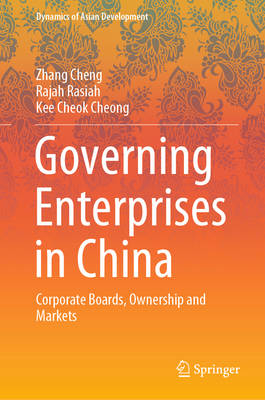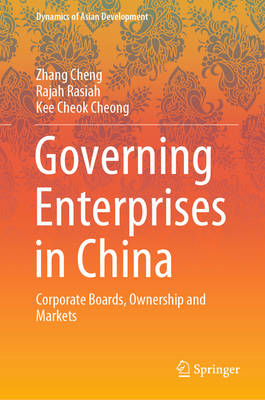
- Afhalen na 1 uur in een winkel met voorraad
- Gratis thuislevering in België vanaf € 30
- Ruim aanbod met 7 miljoen producten
- Afhalen na 1 uur in een winkel met voorraad
- Gratis thuislevering in België vanaf € 30
- Ruim aanbod met 7 miljoen producten
Zoeken
Governing Enterprises in China
Corporate Boards, Ownership and Markets
Zhang Cheng, Rajah Rasiah, Kee Cheok Cheong
€ 213,95
+ 427 punten
Uitvoering
Omschrijving
This book examines the nature of the marketization of corporate boards following the introduction of the split share reform, corporate board and shareholder relations, corporate performance, and risk-taking conduct in China. The chapters cover topics such as determinants of corporate board size and independence, corporate risk-taking conduct under different controlling shareholder types. The book deepens our understanding of corporate governance mechanisms as most previous studies have limited their findings using mainstream perspectives grounded on neoclassical theory. It outlines that China's corporate board composition is determined by the board's scope of operation, monitoring, bargaining power, and other governance mechanisms and regulations. It also offers a comparison between China's experience with other economies in general and other transition economies in particular. As such, the book represents an essential overview of thecurrent concerns regarding corporate governance in China. It is of great interest to legal researchers, policymakers, and legal practitioners working with business investments in China.
Specificaties
Betrokkenen
- Auteur(s):
- Uitgeverij:
Inhoud
- Aantal bladzijden:
- 165
- Taal:
- Engels
- Reeks:
Eigenschappen
- Productcode (EAN):
- 9789811631153
- Verschijningsdatum:
- 25/06/2021
- Uitvoering:
- Hardcover
- Formaat:
- Genaaid
- Afmetingen:
- 196 mm x 239 mm
- Gewicht:
- 453 g

Alleen bij Standaard Boekhandel
+ 427 punten op je klantenkaart van Standaard Boekhandel
Beoordelingen
We publiceren alleen reviews die voldoen aan de voorwaarden voor reviews. Bekijk onze voorwaarden voor reviews.











